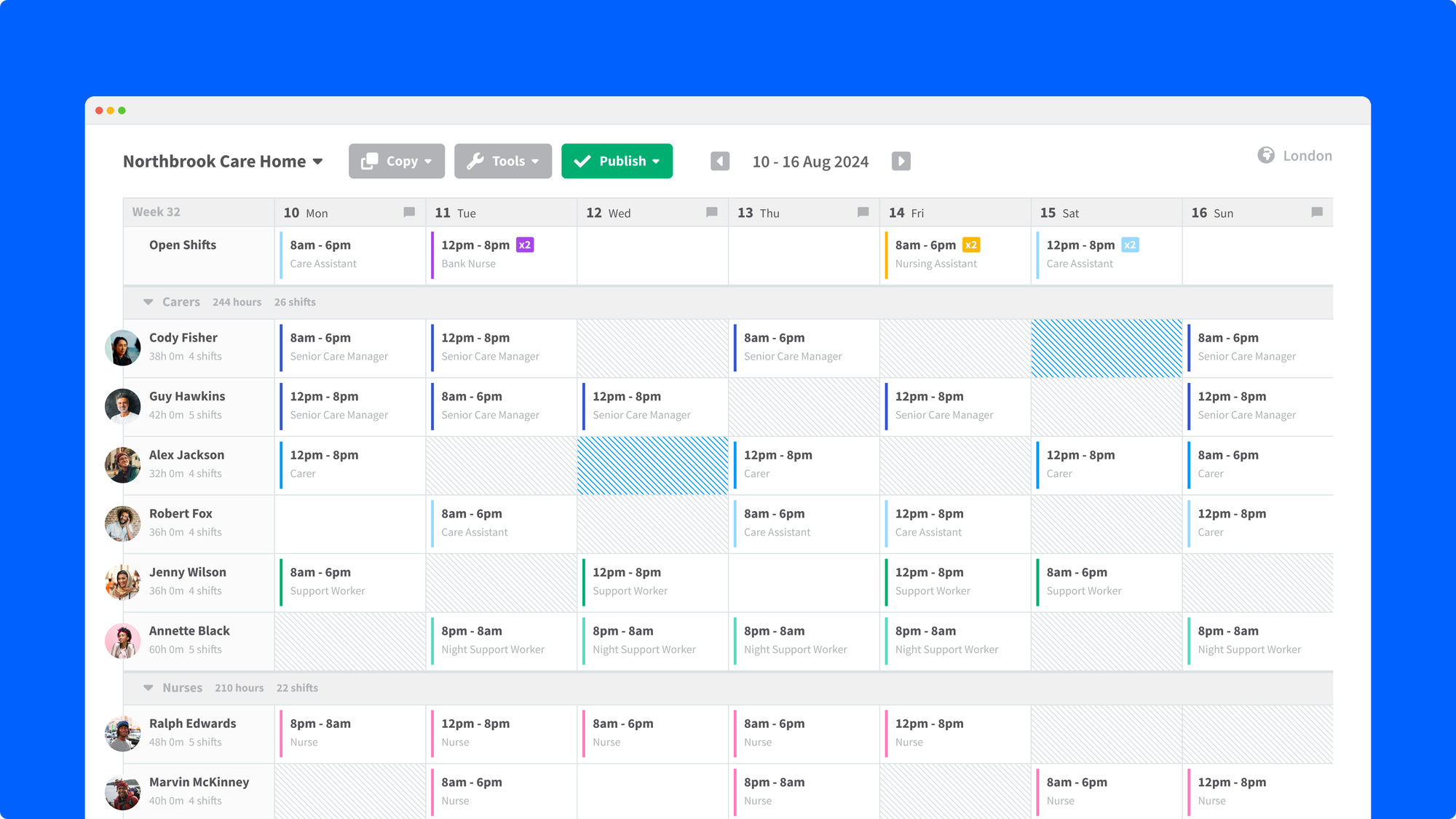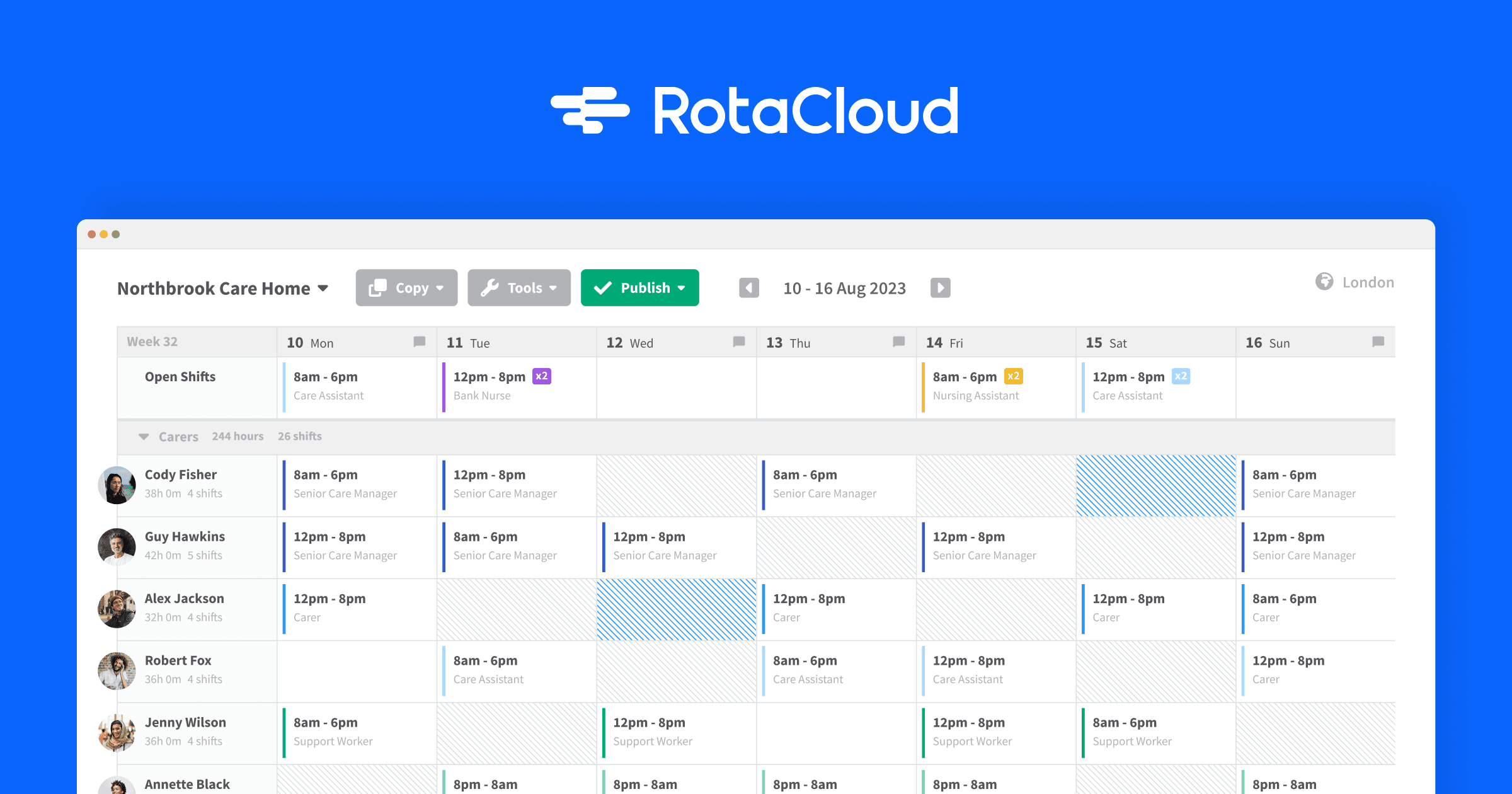If the pandemic taught us anything, it showed that while both care and hospitality suffered in very different ways, the two industries proved their resilience.
But their similarities in challenges unfortunately don’t stop there.
From labour shortages to irregular hours, many issues revolve around - or at least cause or add to - large amounts of stress. What are these and how can they be overcome?
Let’s dive in, shall we?
1. Labour shortages & costs
Rising operational costs and the cost of living, alongside insufficient funding, leads to strains on resources. For two especially skilled sectors, too, investment in training and development is both essential and pricey.
Care
In the care world, resources are constantly strained. With life expectancy growing so often, the ageing population adds to the financial limitations. People living for longer is great, but it means more long-term health conditions, meaning more people to care for in an industry that is already struggling with staffing and funding. What’s more, to meet the additional staffing needs, it is extremely common for care companies to use agency staff, which can be so costly.
Hospitality
Hospitality faces similar challenges with lacking funding and payroll mistakes. But rising operational costs and the cost of living tighten restrictions even more. This forces businesses to re-evaluate their menus and own prices, which also increases their running costs and ingredients costs.
The solution
Budgeting strategies
Without the tools to oversee costs, overspending on resources is likely in both industries. Optimising operational processes is vital to save costs, both current and further down the line.
Being able to set budgets and forecast labour costs, allows managers to constantly have visibility on what is spent and on what. Care homes quickly find that agency use can be entirely cut and hospitality teams can know what hours are planned and fulfilled with staff, to save money to use elsewhere.

Labour cost control
Track real-time data, set budget caps, collect reports, and get a clear picture on how much you’re spending as you schedule.
2. Staffing shortage
While vacancies in the UK are no longer at their all-time high, human health and social work have the highest number in the UK. The third quarter of 2023 alone saw an estimated 179,000 vacancies. As for the hospitality industry, the same period had approximately 121,000 vacancies, which makes the sector the second highest for unfulfilled job roles.
But why do both industries see such high staff shortages?
Care
In our economy, pay for care workers is currently among the lowest. This alongside the likes of irregular working hours and poor workload management leads to poor staff retention, with adult social care seeing a high turnover rate of 28.3% between 2022 and 2023.
England’s adult social care sector saw approximately 1.52 million people in its workforce during 2022-2023, more than the NHS, with a quarter of staff on zero-hour contracts. Even with such high numbers, recruitment and retention is a struggle.
Caring for a patient or client is no 9-5, Mon-Fri job. The same goes for the hospitality industry.
Hospitality
Whether in hotel or bar and restaurant businesses, hours can vary from early morning to late night or even graveyard shifts, and include weekends.
For hospitality in particular, holiday seasons are the busiest time of year where, more often than not, staff find it harder to have a say when they work or have leave requests accepted.
A poor balance between work and personal life can greatly affect staff’s well-being. With very little notice on rotas, sometimes shared less than a week before, alongside last-minute changes, there is very little chance for staff to plan their lives around their shifts. They can feel out of control of their own lives, which can lead to poor mental health. This can lead to an increase in illnesses and staff turnaround.
The solution
Staff retention strategies
The combination of unsociable hours, high workloads and low resources creates a poor employee experience, which can greatly affect your business.
The likes of clear career progression and development paths, as well as training programmes, can help staff feel they are working towards something, improving, and being recognised for their hard work. That encouragement alone can truly flip the mood.
Improving working conditions, environments, and even your rota-sharing routine can help you reduce stress at work. The likes of routines, like shift patterns and releasing a rota at the same time each week, can immediately take certain stresses off staff, knowing what shifts they are working with plenty of notice.
When it comes to overworking, it’s looking at how you can relieve that stress that can truly make a difference. Offering flexible working allows employees to feel more in control of their lives.
Believe it or not, your employees have lives and commitments outside of work hours! Be it child care or seeing friends and family or simply wanting free time for hobbies (or nothing at all!), knowing when they are working is paramount. Trying to plan their lives around shifts (especially when rotas are late or last minute) is detrimental to having a healthy work-life balance.
RotaCloud’s Availability tool allows staff to have input into when they work, communicating their availability. Open shifts are a great feature, too, to notify when additional shifts are available to pick up, letting employees feel in control and choose when to work.

Staff Availability tool
Build a rota that everyone's happy with by using your staff's availability when planning shifts.
3. New technology
Both industries exist in an ever-changing environment, with new expectations and rules appearing seemingly every day. Due to this, care and hospitality companies need to continuously adapt to new ways of working.
Care
For care companies, moving to digital solutions is encouraged. To help with CQC inspections and meeting their standards, digitising records like rotas and timesheets makes it easier for everyone involved and can underpin how safe, effective, caring, well-led, and responsive your practice is.
However, transferring to different ways of doing things is daunting. In care, where each second is precious, a change to routine can be challenging - even if that change can improve those routines and save time, finding time to make that change is a struggle.
The government’s plan from the end of last year was for 80% of adult social care to digitise records (DSCRs) by March 2024. While data has not yet been published on whether this commitment was achieved, more than 60% of providers have adopted DSCRs.
This meant that progress was moving slower than intended, proving that many care companies found some struggle in swapping paper for digital.
Hospitality
Many hospitality businesses upgraded to new technology during the pandemic, mainly to keep them thriving and afloat. However, those late to the game can meet reluctance from potential customers.
Seeing such technology at restaurants and bars has become the norm for customers, so coming across businesses that haven’t yet integrated into digital systems can be a deterrent. Hospitality is aware of this competition with other businesses, but many, especially small and family businesses, can be put off implementing such change.
However, in hospitality, digitising not only keeps you ahead of the competition but also future-proofs everything. Not making the switch sooner makes it more difficult further down the line when technology keeps progressing.
The solution
Digitising strategies
Integrating can seem like a daunting and challenging task. But investing in such technology makes lives easier and ultimately saves so much time usually spent on those boring, occasionally stressful, manual tasks.
When everything you need, from rota planning and automatic timesheets to labour forecasting and reporting, is all in one place with RotaCloud, those time-consuming tasks become a few simple clicks (or taps, if using our mobile app).

Rota planning software
Plan your rotas online in minutes, and spend even less time sending them to staff. Manage shift swaps, time off, and annual leave — all in one place.
Let’s break it down
Care and hospitality industries have more in common than we, and they, may first think - and many of those are challenges they face day in, day out.
- Forecasting tools can cut that manual reporting riiiight down. Being able to digitally set budgets and targets, while constantly overseeing progress, can completely remove overspending on resources like agency use and ingredients.
- Using the tools at hand like open shifts and availability can aid in improving employee experience. This helps staff to feel more in control, improving their work-life balance and well-being. This, in turn, will better staff retention - and, you may notice, productivity!
- Adapting to new ways of working is key to running any successful business, and integrating new technologies is included in that. When both care and hospitality industries’ time is so precious, it isn’t wanted to be spent on tiresome admin tasks. By adopting digital solutions, all of those tasks are combined and cut down that admin time, leaving managers to use that saved time on what matters more - strengthening the business.
Ease and resolve these challenges with RotaCloud by trying it out for a month for free!


